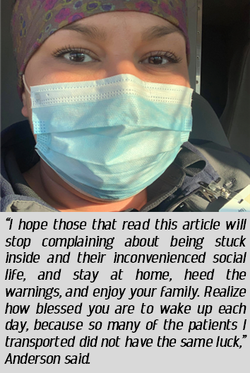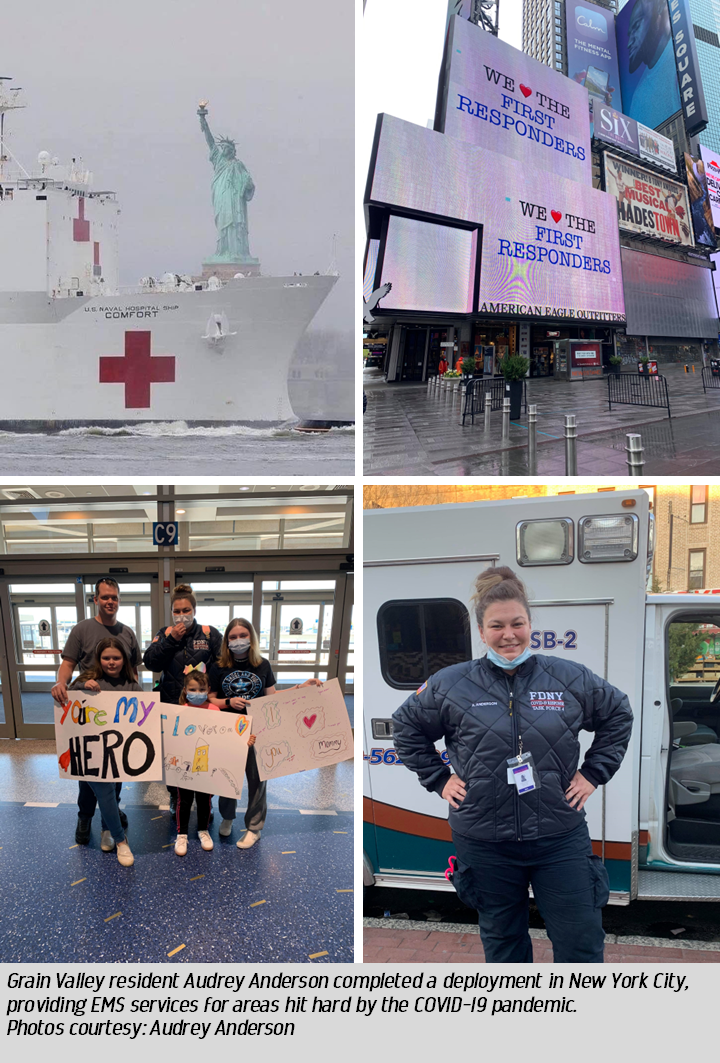|
 COVID-19 has impacted nearly every community in the United States, but none quite as much as New York. According to the New York Times, as of May 13th, New York State has 345,828 total cases and 27,450 deaths. It is hard to get a sense of what this actually feels like on the ground, but one Grain Valley woman saw the impact of this disease up close. Audrey Anderson, a wife and mother of four, left her home in Grain Valley on April 9th to drive with fellow emergency medical technicians (EMT) from Kansas City to New York to support their brothers and sisters in New York City. After several weeks of service in New York, Anderson returned home to quarantine at a campsite in Odessa for fourteen days, finally able to reunite with her family on Mother’s Day. Anderson’s experience in New York has given her a new respect for her colleagues on the ground in New York City and the virus that continues its grip around the world. Anderson graduated from the UMKC School of Medicine EMT program in December 2018 and has been a licensed EMT for nearly two years. Anderson recently began work with Midwest Medical, a transport company based in Nebraska with a station located in Kansas City. As COVID-19 began to spread throughout the country, Anderson’s boss asked if she would be willing to be deployed, as she was one of the few on staff with the Hazmat and FEMA certifications needed to go. “With no clue of where I would be deployed, what exactly I would be doing, and how long I would be gone, I said ‘yes’ without hesitation. One thing everyone needs to understand is that EMS workers get very little pay, work long hours and work in extremely difficult, emotional and dangerous conditions. We do this job because that is where our heart is. We all know these things when we signed up to risk our lives for others each day. This situation was no different. In my mind my brothers and sisters in EMS afar needed our help and I needed to be there for them,” Anderson said. “I knew leaving my family would be taking a huge risk, but we made the decision together as a family. So when I got the call back in April that said I was being deployed to New York City and need to have my bags packed and be at the station in less than four hours, I quickly packed my things and hugged my family goodbye. The thought of going to New York City, the epicenter of the pandemic was a scary thought, and I would be lying to say I didn’t panic and almost turn around a few times and head back home. The one thought that kept going thought my head was my EMS family needs help, so I cannot let them down.” Anderson left April 9th from Midwest Medical’s Kansas City station with a caravan of ambulances that took 36 hours to travel to New York. The caravan stopped in Lincoln, Omaha, Des Moines, and Cleveland to pick up trucks and crew along the way. A total of 15 ambulances and 30 crew members reported to the Bronx Zoo where their deployment staging area was located. “From there we met up with the other 500 EMS volunteers that had flooded in from across the country. Standing there at that moment and seeing all the others that left their families to come help was such an emotional and humbling experience,” Anderson said. The group was divided into two groups. The majority were assigned to interfacility transfers (IFT calls). The remaining, including Anderson, were assigned to Fort Totten, a former army base in Queens, to run 911 calls throughout the five boroughs in the city. “To us, it felt like we had won the lottery. That may sound crazy to say in this situation, but the opportunity to run 911 calls along side FDNY, the most highly regarded EMS service in the country, maybe even the world, was truly a blessing. We were all split up into task forces and assigned to a specific borough. My task force was assigned to run calls in the central Bronx. We were required to be up and out of our hotel to catch the shuttle to the base by 8:00am and would not return to our hotel until 1:00am. Most nights we would be lucky just to get 4-5 hours of sleep.” “Trying to decompress at the end of a long physically and emotionally draining shift was hard, especially if you still needed to do your laundry before you had to get up and do it all over again. I felt like a robot.” “The majority of calls we ran were COVID-19 positive or suspected COVID-19 patients. The others were your normal EDP (emotionally disturbed person), panic attacks, gunshot, stabbings, etc. The biggest heart break was that every 10-15 minutes, a call would come out over the radio for a cardiac or respiratory failure in progress. 90% of those calls were COVID-19 patients, and by the time we arrived is was too late or the all too often ‘well check calls’ that ended in COVID-19 patients being DOA (dead on arrival).” “There were buildings completely ravaged by positive COVID-19 patients because they all share the same elevators and stairwells and struggled with the lack of PPE (personal protective equipment) to protect themselves.” “Most still had to get up every day and go to work to provide for their families. They didn’t have the same luxury most of us do to stay put and wait it out. So many times, we were called out to a residence where most, if not all the family members were positive for COVID-19. One household of 7 already had 4 members of the family that had succumbed to the virus and the looks on their faces of pure terror each time we were called out will haunt my mind forever. They knew they had the virus and would most likely have the same fate as the others. I didn’t know what to do or say to make them feel better. It was incredibly sad. I spent many nights in my truck in between calls or in my hotel room crying for those who were suffering.” The severity of the virus and its ability to impact patients of all ages was a constant reminder while on calls. “This virus is no joke. I have seen firsthand what it can and will do if we do not take it seriously. It is not just the older generation or the people with pre-existing conditions that are being affected. I took countless patients to the hospital that were the perfect example of health and fitness. I saw a 12 year-old girl, the same age as my daughter, die from this virus who was a normal, healthy middle schooler just weeks before,” Anderson said. The memories of these calls and the sights and sounds in the hospitals are still vivid for Anderson. “The noises you hear as you would walk in the emergency department of each hospital. The sound a heart monitor makes when someone is flatlining and losing their life was constant. You would hear multiple going off at the same time and see the hospital staff and EMS frantically doing CPR. The faces of all of us after each call that we couldn’t save someone was devastating. We felt defeated and empty, but all we could do was clean ourselves, our cots, and our trucks, and then off to the next call we went.” “I hope those that read this article will stop complaining about being stuck inside and their inconvenienced social life, and stay at home, heed the warnings, and enjoy your family. Realize how blessed you are to wake up each day, because so many of the patients I transported did not have the same luck.” Back home, Anderson is grateful for the support of her family and friends during her deployment and quarantine. “My family and friends are truly amazing. The love and support that was shown while I was deployed, in quarantine, and now while at home is truly heartfelt and humbling. I received many care packages while in New York City, and had many family and friends stop by my campsite in Odessa with food, booze, and goodies to keep me occupied and sane while I was there for 14 days. The calls and texts I received is what kept my spirits high and kept me going.” Anderson’s quarantine ended on Mother’s Day, and a friend who owns Chef J BBQ in the West Bottoms prepared a meal for her return. “Needless to say, it was the best and most memorable Mother’s Day ever.” Anderson continues to think of her work family in New York City and remembers their support fondly. “The love and support shown to us by FDNY was amazing. From the moment we got there, until the moment we left, they treated us like family. They fed us and welcomed us into their stations with open arms. They gave us shirts and patches and friendships I will forever cherish. We laughed together and cried together. Also, the mutual aid from across the country became family and I still stay in touch with them now that I am home.” “It’s much easier to talk about what happened with those that were out there fighting this pandemic with us than put those images in our family and friends’ minds. It was hard enough for us to handle, let alone telling others about it,” Anderson said. A lesson many of us know but do not often take to heart was solidified for Anderson during this experience. “Don’t take the ones you love for granted, for tomorrow is never promised.” Comments are closed.
|
Categories
All
Archives
July 2024
|
Grain Valley NewsGrain Valley News is a free community news source published weekly online. |
Contact Us |


 RSS Feed
RSS Feed
